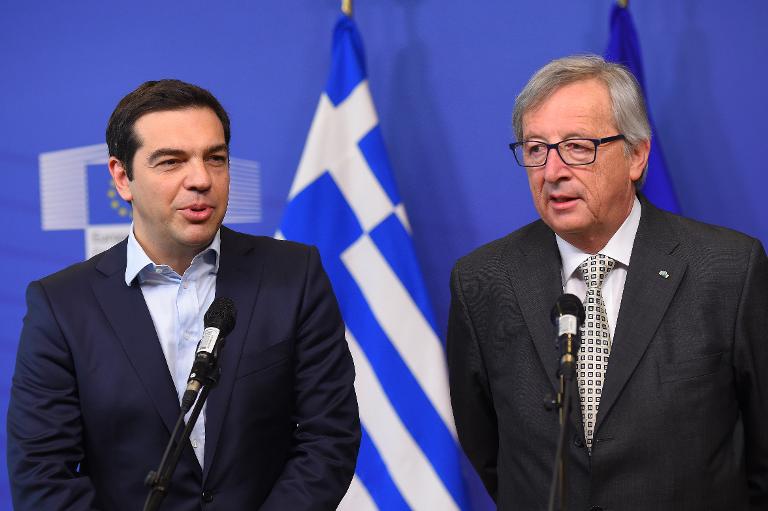
EU, Germany raise 'Grexit' alarm over Greece bailout
Juncker was meeting Alexis Tsipras, the leader of the hard-left Syriza party who came to power in January, just days after Tsipras renewed a demand that powerful Germany repay debts from its Nazi past.
"I am not satisfied by the developments in the recent weeks," Juncker said before talks began with Greece's 40-year-old premier and amid acute concern that Greek coffers could run empty at any moment.
"I don't think we have made sufficient progress, but we will try to push in the direction of a succesful conclusion of the issues we have to deal with."
Greece won a four-month extension of its EU-IMF bailout in February -- despite Tsipras initially saying he wanted to abandon austerity and have a completely new arrangement -- but it will not get any of the cash until new reforms are approved by its eurozone partners.
But frustrations with the Greek government are mounting with its 18 fellow eurozone members after Athens this week renewed the claim to Germany for World War II debts seen as outlandish by its partners.
Greece's harshest critic, German Finance Minister Wolfgang Schaeuble, warned that with all the time wasted, a disorderly "Grexident" that could push Athens out of the euro could not be excluded.
"To the extent that Greece is solely responsible and decides what is to happen, and we don't know exactly what Greek leaders are doing, we can't exclude it," Schaeuble told Austrian broadcaster ORF.
A German finance ministry spokeswoman later rowed back on Schaeuble's comments, stressing that "we do not want Greece to leave."
- 'Verbal violence' -
Eurogroup head Jeroen Dijsselbloem -- the Dutch finance minister whose own relations with new Greek counterpart Yanis Varoufakis have been testy -- also criticised the attitude from Athens.
"In Greece, too much blame for Greece's problems is laid outside Greece and Germany is now the preferred victim," Dijsselbloem told Dutch state broadcaster NOS.
"There's a lot of verbal violence. This doesn't serve any purpose."
Juncker however insisted after his meeting with Tsipras that failure was not an option, and pleaded for a breakthrough.
"I am totally excluding a failure, I don't want a failure. I would like Europeans to go together," the former Luxembourg premier said.
The two agreed that former Latvian premier Valdis Dombrovskis, the European Commission vice-president for the euro, would lead a "task force" that would deal with Greek officials for further talks.
Not included, sources said, would be the controversial Varoufakis who drew social media ridicule Friday after posing in his posh Athens apartment for French celebrity magazine Paris Match.
In the glossy, the left-wing economist is seen posing at a piano and dining on a sunlit roof terrace overlooking the Acropolis while telling the magazine how he abhorred the "star system".
- 'Very worried' -
European officials behind-the-scenes warned that the dangers remained acute.
"Juncker told Tsipras he was very worried and could not exclude an 'accident'," an official told AFP on condition of anonymity. "He urged Tsipras to multiply his efforts .. and avoid statements that could only divide."
With Greece likely to seek a third bailout since 2010 later this year, Tsipras stressed the need for a longer-term solution.
"I want to be sincere to you that I have spent 90 percent of my time to discuss about the short-term deliberations with our partners in order to find a compromise," he said.
"But I think now it's time to think about the future."
Athens faces an urgent cash crunch, having to find 6.0 billion euros ($6.4 billion) in the next two weeks alone to pay its creditors.
That cash emergency deepened after Athens revealed Friday that state revenue was nearly one billion euros short of projections last month.
But as the budget noose tightens, Germany and its partners have held a hard line against the Greek government, which must first detail its reform plans before any release of more European cash.
The EU's economic affairs commissioner Pierre Moscovivi cautioned however that Europeans "probably all agreed ... that a 'Grexit' would be a disaster for the Greek economy, but also for the whole eurozone".
Any country leaving the eurozone could spell the "beginning of the end" of the European project, he said.

Legal Disclaimer:
MENAFN provides the
information “as is” without warranty of any kind. We do not accept
any responsibility or liability for the accuracy, content, images,
videos, licenses, completeness, legality, or reliability of the information
contained in this article. If you have any complaints or copyright
issues related to this article, kindly contact the provider above.


















Comments
No comment